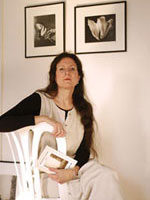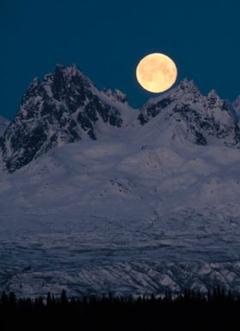Poems by Therese Halscheid
Archives: by Issue | by Author Name

Arctic North
by Therese Halscheid
Therese was raised near a prehistoric pond where the first dinosaur bones were unearthed in North America.

We went where the wind insisted across the frozen river
to reach an abandoned fish camp, a desolate place.
The hat I wore was of wolverine fur — it was like that
in the arctic — for the tribe I stayed with used every part
of what they caught, and the animal was blessed for everything
it offered, and what it gave of itself went well beyond food.
Up river, twenty-some miles, we parked the snowmobile
to climb an embankment but our boots sank suddenly
we were thigh-deep in snow. Couldn’t lift out. Needed to
grab hold of something, though there was nothing to cling to
only firm gusts of wind and a fistful of flakes.
Our hands went down to balance our weight, to lift
our boots from the depths of the windblown drifts,
hoping the snow would hold as we crawled like wild animals,
Kim and I, like a wolverine might have,
had one been there. There were imprints in snow
that Kim said were lynx tracks. When she mentioned
they were fresh, a fear came coursing through. Still,
we inched along while the snow held us, it held as we scaled
to the spot where some cabins were. And where the racks were
for smoking salmon in summer, and a frozen field was,
and behind the field a forest of enduring spruce.
Their boughs were weighted by snow
but beyond that nothing could be discovered.
The lynx that came had gone.
Seemed the land wanted nothing upon it but winter.
It could ward off anything by what it wore.
“Arctic North” appeared in SWWIM
© Therese Halscheid
Land of No Time
the northern interior, Alaska
by Therese Halscheid

In a place of always light or always dark, in the arctic north,
there are no required hours, no hurry for the future
and little thought of the past
the present is one continuing moment --
the body moves to natural rhythms, is fluid with seasons,
living the way a river does
how it carries what comes to it
returns to land, what it was tossed
or think of it this way, choosing when to wake, when to sleep
think of the summer when the sun is constant
all during the summer, when day ends
the light does not
and it is like that
living without the clock
you cannot schedule this part of the earth
there is no passage of time, only change
in the coming and going of moon, in the wind that blows freely
from the cold outer edge
of the world.
“Land of No Time” appeared in US1 Worksheets and in the author’s book Frozen Latitudes (Press 53)
© Therese Halscheid
The Initiation
by Therese Halscheid
From Canary Autumn 2009

It was frightening
to grow calm lying down and yet not know
what sleep held
what the mind of wild trees
might do
black snakes, the alligator
I spotted earlier
in the swamp, anything was possible
already,
I witnessed areas
with no wind and flickering leaves
I had found shadows freeing themselves
enough to come alive
and when, by middle night, a presence
came through the screen, something that
took no form but moved
curiously forward
I, I
who had come this far
to be torn from the civilized world
knew only how to be good to it, was good
to it in opening myself, my limbs
as a woman might
and allowed its power to fall over me
learning, as one’s eyes will do
entering words on a page.
I was read that way
and then,
in a manner which meant acceptance
felt gently closed like a book,
as it left.
Reprinted from Uncommon Geography by Therese Halscheid
© Therese Halscheid
The Telling Wind
Wales, Alaska
by Therese Halscheid

If, in this moment I speak with a voice
it is to say of the ground, it is not fit for trees
nothing grows here but snow
the ice fog moves with nothing to cling to
if I am to speak of the land’s lonely beauty
it is to say of both winter and summer, the color is white
it is to tell of the natural spring
set against the flank of a mountain
and how the people all come to it
going in sleighs with raw air freezing their lungs
of the salty sea, the vast Bering Sea,
to mention that even it freezes
which is to say where walrus are lounging on icebergs
and how, in late spring, the waves house the whale
and of the sky, a sky so shockingly cold, it is to add how
the moon appears with an open mouth.
If, as air, I speak --
if what I speak of is enough
to brush back the thin dry snow
it is to show you the graves of the dead
it is to say of the dead that
all the winters in them, their bodies remember.
“The Telling Wind” first appeared in Imagination & Place: Weather, and in the author’s book Frozen Latitudes (Press 53)
© Therese Halscheid